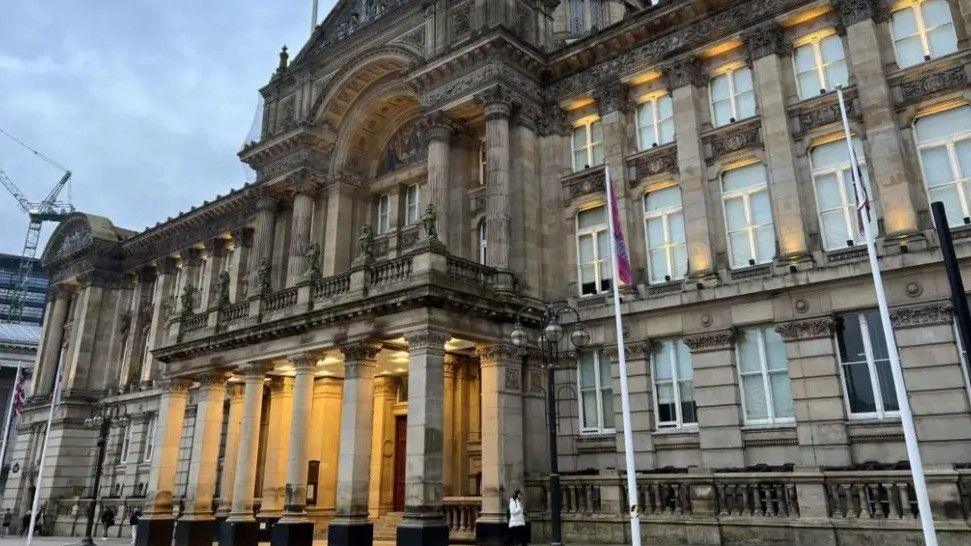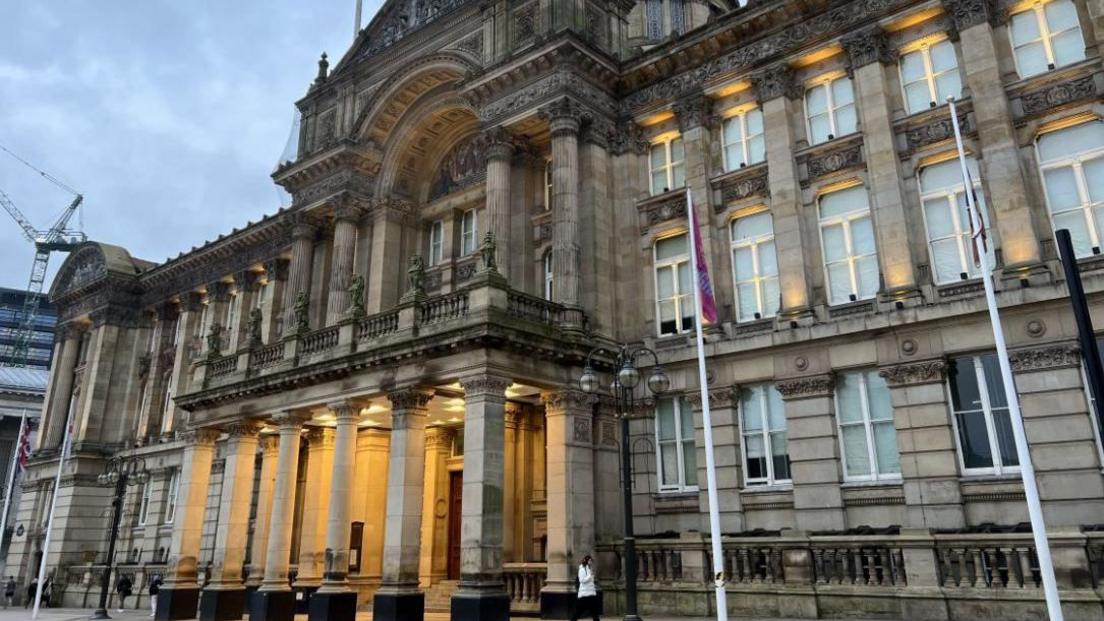Bankrupt council 'lacks capability' to improve

Birmingham City Council signed off budget saving plans in March including a 21% rise in council tax over two years
- Published
A beleaguered council lacks the capability to resolve its problems without outside help, according to the commissioners in charge of overseeing its recovery.
Birmingham City Council effectively declared itself bankrupt in September last year and is now in the process of making £300m worth of cuts to services.
In a critical report, commissioners said the council was letting down residents.
Council leader John Cotton said progress was being made on improvements and that the authority was engaging constructively with the new government.
In September the prime minister said there was “no magic wand” to solve the authority’s financial crisis.
However, critics of the current approach have suggested budget cuts worth tens of millions could be avoided.
In a letter to commissioners, appointed by the last government, local government minister Jim McMahon called for a “more equal” partnership but stressed it was important for the council to continue making “important and timely decisions at this critical stage.”
In their first report examining the council’s progress, the commissioners said they were “under no illusion that more issues will be uncovered” as their work continued.
While they acknowledged every council was under financial pressure, they said this did not excuse the position Birmingham City Council had found itself in.
“The city may well have delivered a magnificent Commonwealth Games but in terms of day-to-day activity it lets its citizens down in so many areas,” they said.
The commissioners added it would require “painstaking attention to detail and following up on every misstep and failure,” to rectify the problems at the beleaguered local authority.
Their report, produced in April, said: “There are many talented and hard-working officers at every level of the council and the organisation has welcomed challenge from commissioners... however, at this stage, the council lacks the capacity and capability to take the necessary steps to address its problems without external support.”
The commissioners described the council’s waste collection and streetscene service as “too expensive” and “not fit for purpose”.
They said that while they had been given significant powers by the government, they had opted not to exercise these fully and had instead chosen to steward the council while it sought to improve.

Protesters gathered outside the council in March when the authority signed off on a wave of cuts to services ahead of a 21% rise in council tax over two years
Conservative opposition leader Robert Alden said: “Labour’s salami slicing has both driven services into the ground and failed to make the necessary savings or transform the council into a modern institution fit for purpose.
“This abject failure has been driven at every instance by the failure of the Labour leadership in Birmingham”.
Leader of Birmingham City Council, Labour’s John Cotton, said there was much more to do to ensure the authority became financially sustainable, but that progress was being made.
"We continue to engage constructively with the new government,” he said.
Mr Cotton added: “It remains clear that the pace of change must further increase, as further savings are identified, and we transform services.
“Our new managing director Joanne Roney is focused on that challenge and there will be no let up as we work together to get the council back on track.”
The council said it agreed an improvement and recovery plan in April, the first part of which has been implemented.
A programme has been put in place to improve waste services, it added, including procurement of a new fleet.
Analysis
By Rob Mayor, Political Editor, BBC West Midlands
The government says it’s in discussions with Birmingham City Council about changing the way it tackles its financial problems.
We’ve known for some time that senior figures in Birmingham want to change the approach to tackling its financial problems and today the government has indicated it’s open to the idea.
A big bailout isn’t on the cards, but extending the time period in which the council has to balance its books is under discussion and that could mean an extra year to get its house in order.
Those who want a change of tack argue it would ease some of the short term pain of swingeing cuts to services, and allow the benefit of wider changes on local government funding and social issues by the new government to take effect.
But critics will point out that the council has a track record of failing to deliver the savings it promises and that delay will mean the pain lasting longer and ultimately costing more as a result.
Get in touch
Tell us which stories we should cover in Birmingham and the Black Country
Follow BBC Birmingham on BBC Sounds, Facebook, external, X, external and Instagram.
Related topics
- Published5 September 2024

- Published4 September 2024

- Published19 August 2024

- Published19 February 2024
